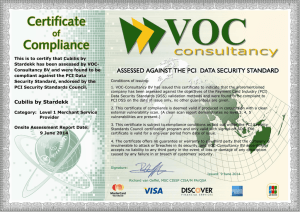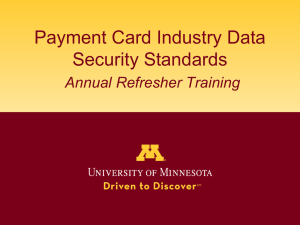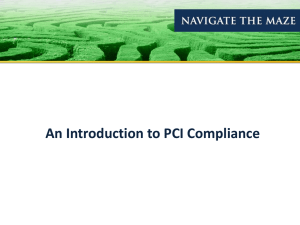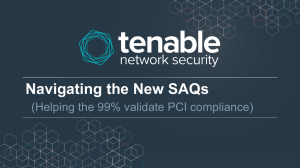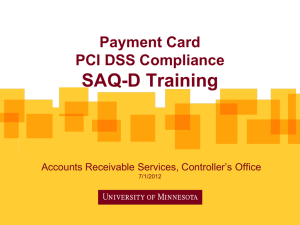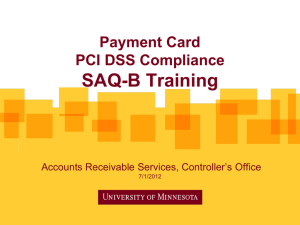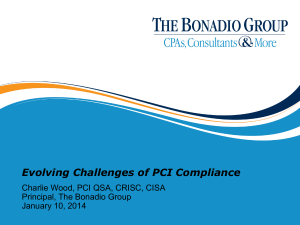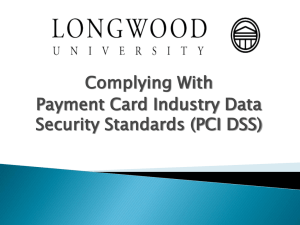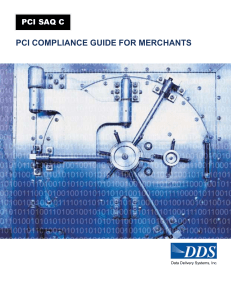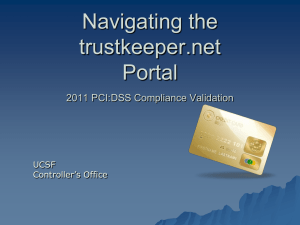Security Update - Information Security Office
advertisement
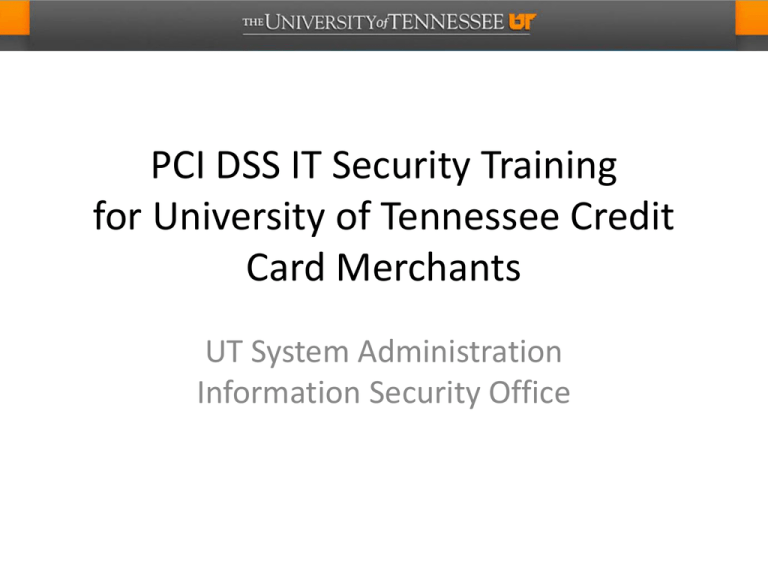
PCI DSS IT Security Training for University of Tennessee Credit Card Merchants UT System Administration Information Security Office UTSA Information Security Office • Chief Information Security Officer – A. J. Wright • IT Security Oversight Team – Jeremy Parrott – Nick Sweet Sandy Lindsey sandy@tennessee.edu Jeremy Parrott jeremy.parrott@tennessee.edu Charlie Seitz cseitz@tennessee.edu John Sturgis jsturgis@tennessee.edu Nick Sweet sweet@tennessee.edu David Bean david.bean@tennessee.edu • IT Security Compliance – Sandy Lindsey • UTSA IT Security Services – John Sturgis • Campus On-site Staff – UTC: David Bean – UTM: Charlie Seitz – UTHSC: Hiring in Memphis! UTSA ISO Services • IT Security Oversight – Assessments: Independent Validation and Verification – Compliance with Legal and Industry Regulations • Security and IT Policy Administration • Compliance-Related Incident Response Coordination – IT System Forensics • Operational Security Services to UTSA Agenda • • • • Overview of PCI DSS PCI Requirements Roles and Responsibilities Next Steps All materials available at: http://tiny.utk.edu/pci-training (and I’ll show that again on the last slide.) Payment Card Industry - Data Security Standard • PCI DSS (2004) – Increase security protections – Reduce Fraud – Protect card holders Where PCI Applies PCI DSS requirements are applicable to credit card Merchants. By itself, use of Cardholder Data (CDH) does not necessarily require PCI compliance. PCI applies to paper as well as electronic storage. Compliance Flow PCI Security Council Issuers and Acquirers Merchants The Importance of PCI Compliance Why is PCI Important? • To manage risk • To protect consumer data • Losses due to fraud • Negative publicity • Loss of consumer confidence • Threat of enforced regulation Why comply with PCI? • To manage your risk • To protect your data • To avoid punitive measures • Potentially significant fines – incrementally increases • To continue processing credit cards Last year, 125 merchants across the University processed 962,000 credit card transactions, totaling around $165 million. 125 PCI Merchants at UT in 2012 IPS, 1 UTSI, 2 Merchant: an entity that enters into a card acceptance agreement with an acquirer or processor. C C-VT D UTIA, 3 SAQ B GSM, 4 VetMed, 6 SAQ A UTM, 15 UTC, 16 UTHSC, 18 UTK, 59 Penalties for Non-Compliance • Fines can include the following: – Fines of $500,000 per data security incident – Fines of $50,000 per day for non-compliance with published standards – Liability for all fraud losses incurred from compromised account numbers – Liability for the cost of re-issuing cards associated with the compromise – Suspension of merchant accounts • Incident investigation must be performed by external company certified by PCI group (estimated $30k - $300k) • UT Fiscal Policy 311 states that: – “University Departments/Units [that process credit cards are] financially responsible for all costs associated with PCI compliance, as well as any fines, fees and remediation expenses associated with security breach.” Self Assessment Questionnaires (SAQs) Complexity and Risk • SAQ A – All cardholder data functions outsourced • SAQ B – Imprint-only or dial out terminals • SAQ C – Payment applications • SAQ C-VT – Web-based virtual terminals • SAQ D – All other types Self Assessment Questionnaire (SAQ) Requirements A B C C-VT D 1 Install and maintain a firewall configuration to protect cardholder data x x x 2 Do not use vendor-supplied defaults for system passwords and other security parameters x x x 3 Protect stored cardholder data x x x x 4 Encrypt transmission of cardholder data across open, public networks x x x x 5 Use and regularly update anti-virus software or programs x x x 6 Develop and maintain secure systems and applications x x x 7 Restrict access to cardholder data by business need to know x x x x 8 Assign a unique ID to each person with computer access 9 Restrict physical access to cardholder data 10 Track and monitor all access to network resources and cardholder data 11 Regularly test security systems and processes 12 Maintain a policy that addresses information security for all personnel x x x x x x x x x x x x x x x UT Fiscal Policy FI0311 • Requirements and guidelines for credit card processing activities at UT – Process for obtaining a Merchant ID • Outlines roles, responsibilities, and approval process – UTSA ISO, ACS, IT POAs, CBOs, Treasurer’s Office, Merchant Depts. • Available on UT Policy website: http://tennessee.edu/policy Roles & Responsibilities from FI0311 • UTSA Information Security Office: – Consulting, guidance, and oversight related to PCI compliance and IT Security controls – Review technical implementations related to PCI – Incident response coordination – Quarterly security scans coordination – Validate SAQs annually • Audit and Consulting Services: – Review departmental policies and procedures Roles & Responsibilities from FI0311 IT Position of Authority (Campus/Institute): • • • • Provide compliance support and consulting Identify and review systems in PCI scope Provide technical guidance Ensure a segmented cardholder data environment exists Roles & Responsibilities from FI0311 Campus/Institute Chief Business Officers: • Approve the business need for a Merchant ID • Attest to SAQ accuracy (with signature) • Monitor PCI compliance Roles & Responsibilities from FI0311 Treasurer’s Office: • Oversee credit card accounting for approved merchants • Manage the Merchant ID approval process • Maintain the relationship with the University’s processor Merchant Responsibilities from FI0311 • Complete Annual SAQ and maintain compliance – Notify Treasurer’s Office of any change in processing • Protect cardholder data and ensure appropriate security controls – – – – Internal Procedures Technical controls on computers that process PCI data Update software on any terminals every 18 months. Place computers in the segmented cardholder data environment (SAQ C, C-VT, D) • Immediately notify UTSA ISO in the event of a data breach • Financially responsible for costs associated with compliance: fines, fees, and remediation expenses High-Level Compliance Requirements • Annual Self Assessment Questionnaire – Incomplete SAQ = Non-Compliant • Annual Scope Verification – What systems are required to be PCI compliant? • Quarterly Vulnerability Scans (SAQ C & D) • Segmented Cardholder Data Environment (SAQ C, C-VT, and D) • Full text available online: https://www.pcisecuritystandards.org/ Cardholder Data Storage Requirements • Card Security Code may not be stored after initial transaction approval. (CVC2, CVV2, CID) • Credit card numbers must only be stored in one location (except backups.) • Complete cardholder information may not be stored in an unprotected manner. • All computers that handle, process, or store card numbers must be registered. • Merchants may not use mobile phones for processing. PCI Incident Response • Report Security Incidents to UTSA ISO – Computer, network, or paper-based activity – (May) result in Example Security Incidents: • • • • • Misuse Damage Denial of service Compromise of integrity Loss of confidentiality • • • • • Attacks launched on others Compromise of user account Compromise of computer systems Viruses, Worms, and Trojan Horses Disclosure of protected data • Unauthorized access • E-mail release • Inadvertent posting a web site • Need to demonstrate prompt response Primary Risk Area • Attacks on Users – Phishing & Social Engineering – Malicious websites • Unpatched systems – System & application vulnerabilities – Zero-day vulnerabilities • Limit exposure to email and Internet sites Review • • • • Overview of PCI DSS PCI Requirements Roles and Responsibilities Next Steps Next Steps • Complete Annual SAQ – Questions? Contact Treasurer’s Office or ISO • Review Documentation – Policy FI0311 – SAQ Requirements Documents • Reduce PCI scope – Move information systems into the cardholder data environment • Reduce PCI risk – Outsource credit card processing – Minimize UT exposure to cardholder data – Reduce exposure to websites and email Thank you! Questions? This information is available on the PCI Training website: http://tiny.utk.edu/pci-training
